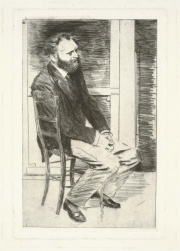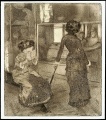Difference between revisions of "Drypoint"
Jump to navigation
Jump to search
| Line 1: | Line 1: | ||
| − | [[File:60.257-SC26119.jpg|thumb|]] | + | [[File:60.257-SC26119.jpg|thumb|Drypoint<br>MFA# 60.257]] |
== Description == | == Description == | ||
| − | + | [[File:1983.306-SC26126.jpg|thumb|Drypoint<br>MFA# 1983.306]] | |
An [[intaglio]] printing technique prepared by scratching a design directly onto a printing plate, without the use of an [[etching ground]]. The plate is usually a metal sheet, with a sharp-pointed tool. Drypoint prints characteristically have a fuzzy appearance due to the burrs and ridges along the printed lines. Initially used in the late 15th century by artists such as Dürer, the technique was replaced by mechanized printing but regained some popularity by the 19th century. | An [[intaglio]] printing technique prepared by scratching a design directly onto a printing plate, without the use of an [[etching ground]]. The plate is usually a metal sheet, with a sharp-pointed tool. Drypoint prints characteristically have a fuzzy appearance due to the burrs and ridges along the printed lines. Initially used in the late 15th century by artists such as Dürer, the technique was replaced by mechanized printing but regained some popularity by the 19th century. | ||
| Line 11: | Line 11: | ||
<gallery> | <gallery> | ||
| − | File:1974.533-SC31304.jpg| | + | File:1974.533-SC31304.jpg|Drypoint<br>MFA# 1974.533 |
| − | File:1983.220-SC28842.jpg| | + | File:1983.220-SC28842.jpg|Drypoint<br>MFA# 1983.220 |
| − | + | File:1983.310-236-27.jpg|Drypoint<br>MFA# 1983.310 | |
| − | File:1983.310-236-27.jpg| | + | File:31.1287-SC15110.jpg|Drypoint<br>MFA# 31.1287 |
| − | File:31.1287-SC15110.jpg| | + | File:41.813-SC25941.jpg|Drypoint<br>MFA# 41.813 |
| − | File:41.813-SC25941.jpg| | + | File:1976.744.det.jpg|Drypoint detail<br>MFA# 1976.744 |
| − | File:1976.744.det.jpg|Drypoint | + | File:1976.744.det.plate.jpg|Drypoint detail<br>MFA# 1976.744 |
| − | File:1976.744.det.plate.jpg|Drypoint | ||
</gallery> | </gallery> | ||
Revision as of 10:07, 25 July 2022
Description
An Intaglio printing technique prepared by scratching a design directly onto a printing plate, without the use of an Etching ground. The plate is usually a metal sheet, with a sharp-pointed tool. Drypoint prints characteristically have a fuzzy appearance due to the burrs and ridges along the printed lines. Initially used in the late 15th century by artists such as Dürer, the technique was replaced by mechanized printing but regained some popularity by the 19th century.
Synonyms and Related Terms
dry point; Kaltnadelredierung (Deut.)
Additional Images
Resources and Citations
- Encyclopedia Britannica, http://www.britannica.com Comment: "drypoint." Accessed 3 Feb. 2005 .
- Luis Nadeau, Encyclopedia of Printing, Photographic, and Photomechanical Processes, Atelier, New Brunswick, 1997 Comment: copper or zinc plate
- The Bullfinch Guide to Art History, Shearer West (ed.), Bullfinch Press, Boston, 1996
- B. Gascoigne, How to Identify Prints, Thames & Hudson, London, 2004








